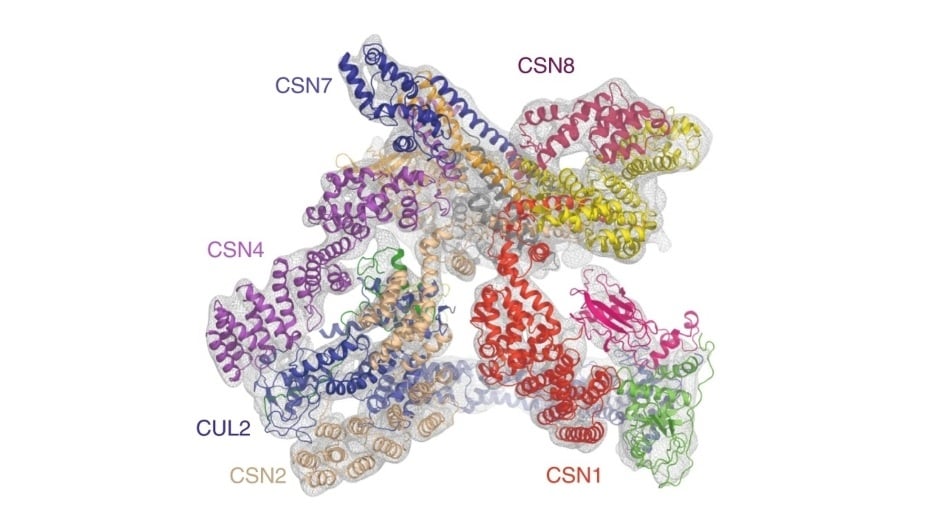
Image: Structural map including the 'Cullin 2 RING' E3 ligase. Detail from Faull S et al (2019). Nat Comms 10:3814, fig 1. More information.
The biotechnology company Monte Rosa Therapeutics – originally a spin-out from research at The Institute of Cancer Research, London – has announced that the first patient has received their ‘molecular glue degrader’ drug as part of a clinical trial in oncology.
The investigational drug, called MRT-2359, targets a protein called GSPT1. It was discovered following a programme of ICR research that developed a library of ‘protein degraders’ – drugs that wipe out proteins by hijacking the cell’s own waste disposal processes.
That research programme initiated the discovery of degraders targeted at GSPT1, and discovered the drug’s precursor candidate MRT-048.
The drug has entered a phase I/II clinical trial in patients with cancers driven by the protein Myc, including lung cancers.
Monte Rosa Therapeutics spun out from ICR research led by scientists in our Centre for Cancer Drug Discovery. The company was formed in 2018 and in 2021 listed on the NASDAQ stock exchange in New York, raising more than $220m at its Initial Public Offering (IPO).
Protein degradation and oncology
The company’s focus is on the discovery and development of molecular glues, a type of innovative drug. Molecular glue degraders hijack proteins from a family called the E3 ubiquitin ligases, also known as E3 ligases, which play an important role in natural protein degradation.
Molecular glues work by inducing new, ‘neo’-interactions between a target protein, such as one that causes cancer, and an E3 ligase to form a three-protein complex.
The E3 ligase then ‘tags’ the target protein with ubiquitin – a small protein that’s used in cellular processes in all multicellular organisms – which acts as a signal to another, multi-protein complex called the proteosome.
The proteosome then ‘gobbles’ up the target protein and destroys it.
Protein degradation at the ICR
Protein degradation is an area of intense focus at the moment for researchers in cancer drug discovery. The ICR is pioneering research in this area and last year, we launched our Centre for Protein Degradation – made possible by a £9 million donation from David and Ruth Hill.
Scientists in the Centre for Protein Degradation are focused on targeting deadly and currently undruggable cancer proteins.
Dr Olivia Rossanese, Director of Cancer Drug Discovery at the ICR, said:
“It’s always very pleasing to see a new drug that we’ve been involved in discovering reach the clinic. This is the thirteenth drug candidate to reach clinical trials since 2005 alone thanks to our research, and that’s a record of which we’re extremely proud.
“With this new ‘molecular glue’ drug, our part was in the development of a library of innovative molecular glues, research to validate GSPT1 as a target, and the discovery of early drug candidates. Monte Rosa Therapeutics then took the reins and developed a leading candidate into clinical trials.”
Molecular glues v PROTACs
As well as leading research into the discovery and development of molecular glue degraders, the ICR is also researching another drug type called PROTACs, short for proteolysis targeting chimeras. PROTACs also work by recruiting an E3 ligase to break down a protein target.
A major difference between molecular glue degraders and PROTACs is that PROTACs are made of three sub-units: one that binds to a target protein, another that binds to an E3 ligase, and a smaller ‘linker’ component that joins them together.
Molecular glues, on the other hand, induce changes to a target protein to encourage interactions between another protein – in the case of GSPT1, the E3 ligase.